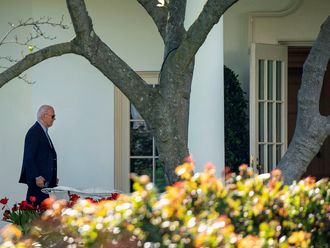Iran
Some groups “will never be anything but our enemies”, Trump said after attacking Obama for doing deals with Iran. Only he claimed shortly afterwards: “The world must know we do not go abroad in search of enemies, that we are always happy when old enemies become friends, and when old friends become allies.”
Nato
Trump also blasted Obama for letting down existing overseas partners, promising “America is going to be a reliable friend and ally again”. Yet he delivers warnings about paying for Nato membership that might sound more like blackmail to some. “The countries we are defending must pay for the cost of this defence — and, if not, the US must be prepared to let these countries defend themselves.”
Nation-building
He was also ambiguous about America’s role in promoting democracy in the world, claiming “we are getting out of the nation-building business” but then adding: “I will work with our allies to reinvigorate western values and institutions.” He also argued that promoting “western civilisation and its accomplishments will do more to inspire positive reforms around the world”.
Extremism
Then there is the standard section of any recent US presidential speech that calls on Middle East nations to do more to fight Islamic extremism. “This has to be a two-way street. They must also be good to us and remember us and all we are doing for them,” he said of allies in the region. These comments might have more clout coming from someone who had not recently offended much of the Muslim world by threatening to ban their citizens from entering the US.
Obama’s ‘humiliations’
Some criticisms of Obama’s “humiliations” at the hands of foreign governments do not stand up to much scrutiny either. Trump said that Obama was snubbed during recent state visits to Cuba and Saudi Arabia because he was not greeted at the airport by a senior leader. “Perhaps an incident without precedent in the long and prestigious history of Air Force One,” claims Trump. Strangely, the Queen’s decision to send the lord-lieutenant of Essex — hardly the most prestigious of British officials — to meet Obama at London’s Stansted airport last week was not mentioned, perhaps because it is a pretty standard way of doing things.
Olympics
A similar non sequitur arises in criticism of Obama’s failed attempt to persuade the International Olympic Committee to award the 2016 Summer Games to Chicago. The president should not have flown all the way to the IOC meeting in Copenhagen if he did not already know they were going to award the games to the US, argued Trump. But what would have been the point of flying all that way to lobby for something that had already been secured?
Principles v unpredictability
Perhaps Trump is just trying to live up to his maxim of keeping the world guessing. “We have to be unpredictable and we have to be unpredictable starting now,” he argued at the start of the speech. Except, by the end, he argued for the virtues of a more transparent and principled approach: “The best way to achieve those goals is through a disciplined, deliberate and consistent foreign policy.”
Migration
Sometimes it is best not to apply too much mathematics. Trump claimed, for example, that “there are scores of recent migrants inside our borders charged with terrorism”, an assertion already open to dispute, but went on to add on top “for every case known to the public there are dozens and dozens more”. If “scores” means at least 40, then by this logic, Trump is claiming the existence of around 1,000 more people than anyone else has.
US interests
If the speech has one abiding slogan, it too could have done with some more fact-checking. Putting America first sounds at first just like an extension of Trump’s hallmark promise to make America great again. Yet it also harks back to the America First Committee of the 1940s, a group set up to prevent the US from joining the Second World War, only to be disbanded three days after the attack on Pearl Harbor.
Isolationism v interventionism
But perhaps this just points to the biggest contradiction of the speech: the tension between its isolationism and its interventionism. At once, Trump urges more of a pragmatic and realist approach to the exercise of US power, unconstrained by the niceties of political correctness, and yet blasts Obama for having “no vision, no purpose, no direction, no strategy”.











